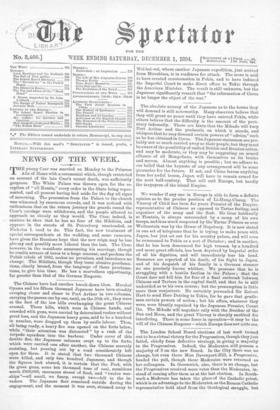The Chinese have had another knock-down blow. Marshal Oyama and
his fifteen thousand Japanese have been steadily .creeping closer and ()loser to Port Arthur in two columns, oarrying the passes one by one, until, on the 20th ult., they were at the foot of the low hills overhanging the great Chinese arsenal. These hills, which were in Chinese hands, and crowded with guns, were carried by determined rushes without great loss, and the Japanese heavy guns, said to be a hundred in number, were dragged up them by coolie labour. Then, all being ready, a heavy fire was opened on the forts below, while " their attention was distracted " by a rush of the torpedo squadron into the harbour. Under cover of this double fire, the Japanese columns crept up to the forts, which were carried one after another, the Chinese scarcely resisting, but pouring out by a road considerately left open for them. It is stated that two thousand Chinese were killed, and only two hundred Japanese, and though the figures look absurd, it is certain that the Port, with its great guns, some ten thousand tons of coal, munitions worth £800,000, enormous stores of food, and " twelve war- chips "—all small, we fancy, except two—fell to the in- vaders. The Japanese lied remained outside during the engagement, and the moment it was over, steamed away to Wei-bai-wei, where another Japanese expedition, just arrived from Hiroshima, is in readiness for attack. The news is said to have created consternation in Pekin, and to have induced the Imperial Court to make direct offers to Tokio through the American Minister. The result is still unknown, but the Japanese significantly remark that "the reformation of Corea is no longer the object of the war."


















































 Previous page
Previous page